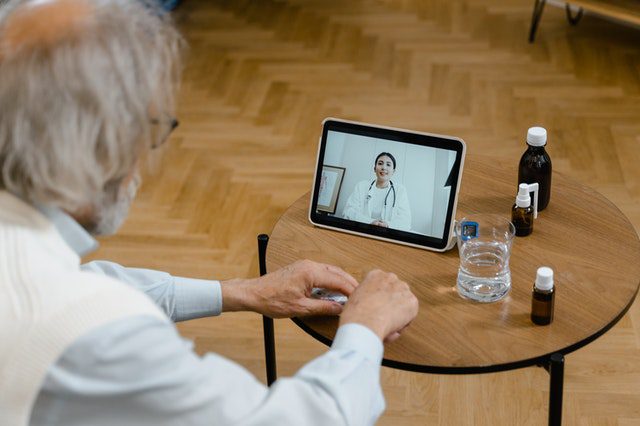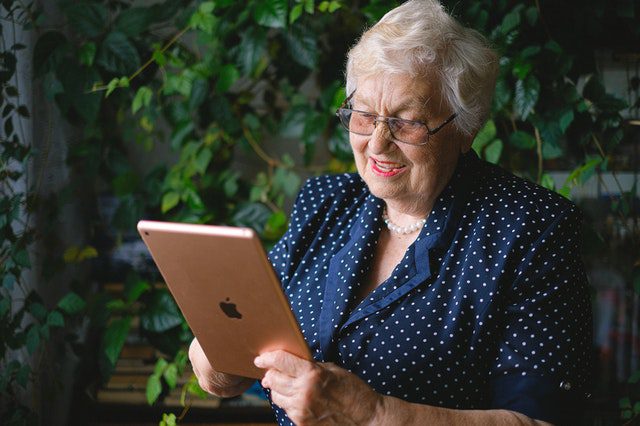You can’t always be there. But we can.
Telemedicine for the Elderly: 7 Ways This New Format is Revolutionizing Care For Seniors

PTSD in Elderly Veterans: The Best Ways to Help
August 12, 2021
Cold and the Elderly: How to Keep Them Warm
December 21, 2021Telemedicine for the Elderly: 7 Ways This New Format is Revolutionizing Care For Seniors
In this post-pandemic era, a new wave of virtual services is being made available by almost every industry. Healthcare is no exception. While telemedicine services are beneficial for people of all ages, there is one group that stands to benefit the most: seniors.
As one of the demographics most at risk for COVID-19, telemedicine for the elderly helps by utilizing technology to provide seniors with safe, one-on-one care and minimal contact. At a time when the world is tackling a public health crisis, telehealth for seniors offers many advantages that support their overall well-being.

Here are 7 ways that telemedicine is providing a more effective care approach for seniors:
1. Reduces the burden of travel
For starters, telehealth reduces the burden of travel for patients. In terms of cost, studies show that telemedicine saves patients money that would otherwise be spent in traveling to and from appointments. This is especially beneficial to seniors with limited access to transportation and mobility problems. Additionally, caregivers are spared the challenges that can often come with preparing seniors for travel — leaving them more time to focus on in-home care.
2. Remote health monitoring
With a reduced need for transportation, telemedicine for elderly adults opens up the possibilities for remote health monitoring. With the use of telehealth technologies, healthcare providers are able to provide routine health monitoring on a remote basis. By these means, seniors with illnesses and chronic conditions that necessitate routine monitoring can do so without the need for in-person visits, which can be both costly and difficult for immobile patients.
3. Decreased risk of hospital visits
Adopting telehealth services for seniors helps to improve communication between healthcare providers and their patients. With routine monitoring done remotely, physicians are able to keep a close eye on their overall health. This means that healthcare providers are more likely to intervene before a problem develops to a point where hospital care is needed. Telemedicine for elderly patients not only reduces emergency hospital visits but the heavy cost that comes with them as well.

4. Increased access to specialists
Telemedicine improves care access for patients all around. However, seniors are a demographic that is generally more at risk for chronic conditions that require specialized healthcare. Given that specialists aren’t always located near patients, travel is often needed. This comes at a cost — both financial and physical for seniors with mobility difficulties. Telehealth for seniors removes that barrier, connecting more seniors to the specialized care they often require.
5. Relieves stress for all parties
Telehealth is simply more convenient. Many seniors are unable to live independently. Utilizing telemedicine services for elderly individuals relieves stress on caregivers in many ways. For starters, telehealth services make helpful information more accessible to caregivers that can enable more effective senior care. Additionally, it saves time. Caregivers are able to dedicate more time and attention to in-home care, as well as their professional and personal lives.
On the other hand, the burden of traveling to and from healthcare appointments is both costly and physically challenging for many elderly individuals. With mobility difficulties come the added cost of transportation and increased risk of contracting viruses. With the need for travel, there is the added stress of breaking their usual routine. This can be especially challenging for patients with dementia or other cognitive problems. Telehealth practices for seniors alleviate the overall burden that often comes with traveling to and from doctor’s appointments.

6. Reduced cost for all parties
Telemedicine for elderly patients is a more economical option for both patients and healthcare providers. With less-time consuming visits, physicians are able to maximize their time more effectively. More time for patients means increased revenue for healthcare facilities and practices. Moreover, telehealth for seniors equates to cost savings for both patients and senior care facilities. Since telehealth visits typically cost less and there is no added cost associated with travel, patient care costs are reduced.
7. Safer and more secure
It is not hard to see the safety benefits that come with utilizing telemedicine services for elderly patients. For one, the need for travel does not exist. This means older patients with mobility difficulties don’t have to worry about leaving the comfort of their own home and risk inaccessible walkways, stairways, and such. Additionally, it takes the stress off of caregivers to facilitate the comings and goings of in-person visits. Furthermore, telehealth services for seniors are legally required to abide by Health Insurance Portability and Accountability Act mandates (HIPPA). This makes telemedicine just as secure, if not more, than in-person visits. Therefore, reducing further stress for both seniors and caregivers.

At a time when the world is working with technology to reshape normalcy post-pandemic, telemedicine for elderly patients is a quality solution for almost every party involved. Most importantly, telehealth removes many roadblocks that seniors tend to encounter when accessing in-person visits — making telehealth a much more effective way to receive care. As technology improves, there is no doubt that telehealth will continue to be embraced for safer, more effective senior care practices.

